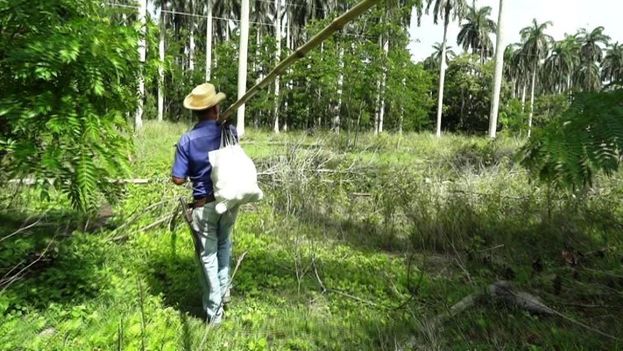
![]() 14ymedio, Sol Garcia Basulto, Camagüey, 8 December 2105 – In an act that mixes rebellion and impatience, the residents of Las Casimas in Camagüey have improvised a four kilometer long power line to bring service to their village. After years of negotiations and requests, the farmers did not want to remain in the shadows, and so they have scrounged to connect themselves to the nearest area that receives services from the Electric Company.
14ymedio, Sol Garcia Basulto, Camagüey, 8 December 2105 – In an act that mixes rebellion and impatience, the residents of Las Casimas in Camagüey have improvised a four kilometer long power line to bring service to their village. After years of negotiations and requests, the farmers did not want to remain in the shadows, and so they have scrounged to connect themselves to the nearest area that receives services from the Electric Company.
This alternative effort includes transformers, insulators and professional wiring, as well as posts made with trees along the alignments whose branches were removed. To finance the project, the families contributed according to their economic resources. In all, the figure reached about 4,000 convertible pesos.
The community of Las Casimbas, in the Najasa district in the province of Camagüey, is one of those places officially outside the area served by the Electric Company in the district it is a part of. There are 20,000 homes on the island without electric light. This last November, the Minister of Energy and Mines, Alfredo Lopez Valdes, assured that they would have this service in 2017, and that, at the end of this month, electricity would reach 33 settlements – some 1,610 homes – most of them in Plan Turquino and areas difficult to access.
The state company did not want to respond to 14ymedio’s question about the reasons why power has not yet reached Las Casimbas. However, an official of the Electric Company who preferred anonymity said that he was aware of the initiative taken by the villagers in the area to “light their houses and be able to enjoy other advantages of electrical service.” People there are afraid of reprisals from the Electric Company and the biggest nightmare right now in Las Casimbas is that the costly wire they have strung will be cut by orders “from above.”
Despite its simplicity, the structural quality of the engineering work organized by their own efforts is surprising, and supplies electricity to more than 30 families. Residents paid out of their own pockets for teams of professional to optimize the quality of service, according to the project coordinator, a farmer in the area nicknamed Toño.
“The transformers, cables and insulators were used, but in good condition. Some friends of mine who work in the utility bought them,” said the resident. He adds: “In this place, there has never been power. Only wealthy people had the privilege of illumination fueled by oil, but the rest of us were born and grew up with our nostrils blackened by candle smoke.”
Toño owns two caballerías of land – about 66 acres – that he inherited from his parents, but is not considered among the so-called “haves,” because, he says, it takes a lot of work to exploit the benefits of the earth because of “the lack of agricultural products.” The lack of electricity is added to these obstacles, making it difficult to pump water and do other work in the field.
“We pushed for power because it is very necessary, we need it for everything, for light, to watch TV,” says another local resident. Considering that, for decades, people in the village “knew nothing about the world… If someone was talking about a soap opera, we had to remain silent, without being involved in the conversation. This is why people gave the money without protest to buy the equipment and cables.”
“They put solar panels on the clinic and on the little school of San Ramon – a nearby neighborhood – but the houses didn’t have light, or any appliances, except radios and flashlights that use batteries,” says Toño.
In this area, the price of a battery of the kind most used for flashlights and radios is 20 Cuban pesos, the equivalent of two days of work in the field. “Things like the rice cookers and electric pots and ovens that they have been distributing for years mean nothing to us. Here the women cook with wood or charcoal, people don’t know what cold water (from the fridge) is, nor do they have cellphones. It is not out of ignorance, because you go out and see how people live in town, but because without power it’s impossible,” he points out.
According Toño, the new alternative does not solve the entire problem. “The voltage is too low, refrigerators only freeze late at night. We bring the current from a line like this. The transformer is what makes up the voltage, but at peak times it cannot supply all the houses.”
However, the experience of Romelio, another local resident, is positive. “We have improved a hundred percent, we were living here like the indigenous people in caves, in Cro-Magnon times, with no distraction at all, when night came you went to bed,” he explains. He says that without cell phones, when anyone got sick there was no way to call an ambulance or a doctor. “This is a place that is very isolated and so we struggle to live as people.”
